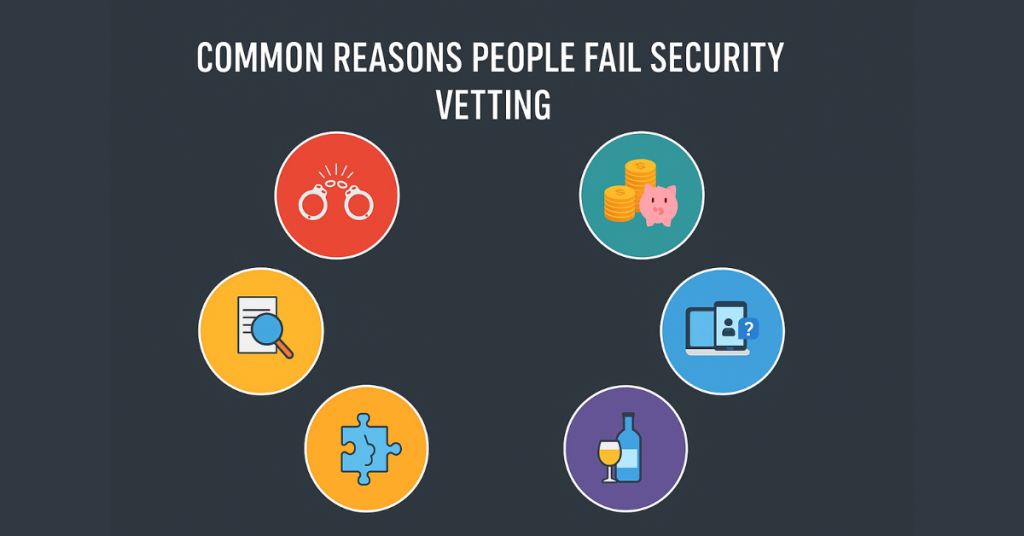Security vetting is an essential part of recruitment for roles that involve access to sensitive information, secure premises, or regulated environments. Employers rely on vetting to decide if an individual can be trusted with certain responsibilities. However, a significant number of applicants experience delays, rejections, or full denials during this process.
Understanding why security vetting is denied starts with knowing how the system works, what’s being assessed, and what behaviours or history might raise red flags. Failing vetting doesn’t always mean someone has done something wrong; in many cases, it’s due to overlooked issues or a lack of transparency.
Let’s explore the most common reasons to fail security vetting, how those reasons are interpreted, and what can be done to improve your chances of passing.
Table of Contents
ToggleWhat Is Security Vetting?
Security vetting is a structured background-check process used by public and private organisations to evaluate a person’s reliability, honesty, and integrity. There are various levels of vetting depending on the role, ranging from basic employment checks to more advanced screenings like BPSS (Baseline Personnel Security Standard) or BS7858 checks used in the UK.
The depth of vetting usually depends on how much access an employee will have to classified data, secure systems, or physical areas. While some checks only confirm identity and employment history, others investigate financial records, criminal convictions, associations, and even personal conduct.
Common Reasons People Fail Security Vetting

Criminal Record
One of the most frequent reasons to fail security vetting is having a criminal record that suggests dishonesty, violence, or a lack of respect for legal boundaries. While not all criminal offences are disqualifying, unspent convictions for theft, fraud, or assault will usually raise immediate concerns. For high-security roles, even minor or historical offences may result in a failed vetting decision.
Financial Instability
Financial instability is another major factor. Candidates with multiple unpaid debts, recent bankruptcies, or County Court Judgments (CCJs) may be considered vulnerable to bribery or coercion. Vetting officers don’t necessarily expect perfect credit scores, but they do assess how well an individual manages their finances. Those who appear careless or secretive about their financial history may face delays or rejection.
Dishonesty in Application
Dishonesty is taken very seriously throughout the vetting process. Even small inconsistencies in your application, such as a misstated job title, unexplained gaps in employment, or conflicting address histories, can trigger further investigation. If the vetting body believes you were deliberately withholding information or providing false details, that alone can be grounds for denial.
Overseas Connections and Travel History
For applicants who have spent significant time overseas or who maintain frequent contact with individuals in high-risk countries, security teams may require more detailed documentation. Travel to or associations with politically unstable or sanctioned regions can raise concerns about espionage, divided loyalties, or exposure to external influence. This doesn’t mean foreign travel itself is a problem, but it must be declared, documented, and explained clearly.
Lifestyle and Online Behaviour
In some cases, people face failed security vetting due to issues in their personal lives. For instance, drug or alcohol dependency, especially when unacknowledged, can reflect poorly on someone’s reliability. Online behaviour may also be reviewed, particularly for public-facing or politically sensitive roles. Social media posts that promote violence, hate, extremism, or criminal activity may be used to determine an applicant’s suitability.
Associations and Personal Relationships
Even personal relationships can come under review. Living with or being closely associated with someone who has a history of serious crime or radical views might lead to further questioning. The vetting process isn’t just about the individual; it’s about the risk they may introduce, even unintentionally.
Transparency and Consistency Matter
One of the most overlooked reasons to fail security vetting is simply not being open enough. Many people are tempted to omit past mistakes, thinking minor discrepancies won’t be discovered. But vetting professionals are trained to detect gaps, mismatches, and warning signs.
Being truthful doesn’t mean you’ll automatically pass, especially if the disclosed issue is serious, but it does show that you’re responsible and willing to be accountable. Candidates who explain situations honestly and supply evidence of change (e.g. debt repayments, completed treatment programs, or character references) are often viewed more favorably than those who try to hide issues.
Mismatches in identity paperwork can appear suspicious unless clearly explained.
What If You’ve Failed Security Vetting?
If you’ve been told you failed a security vetting check, it can be discouraging, but you’re not alone. Every year, thousands of applicants are denied vetting clearance, often for issues they didn’t realise were significant. The first step is to request clarification on what part of your application caused the problem. While agencies may not share every detail, you can usually get a basic understanding of the concern, financial, legal, reference-related, or otherwise.
In some cases, you may be allowed to reapply after a set period or once certain conditions are met (e.g. resolving debts, clearing a record, or supplying missing documents). Other times, you might be eligible for a lower level of clearance that doesn’t require the same depth of background checking.
If you were denied clearance for a role that required BS7858 vetting or a BPSS check, it may not affect unrelated jobs. Each employer has different criteria. However, a previous failure does become part of your vetting history and may be reviewed in future applications.
Bottom Line
Security vetting plays a critical role in protecting sensitive roles and information. But the process isn’t flawless, and many people are caught off guard by how strict it can be. Failed security vetting happens for a range of reasons, some minor, some serious, but most are preventable with proper planning, transparency, and attention to detail.
Need a head start with your background check? If your role requires BS7858 vetting or you’re looking to complete a BPSS check online, make sure your application is clean, complete, and consistent. Vetting doesn’t have to be stressful. We are here to help you navigate the essentials and support your documentation process with clarity.

